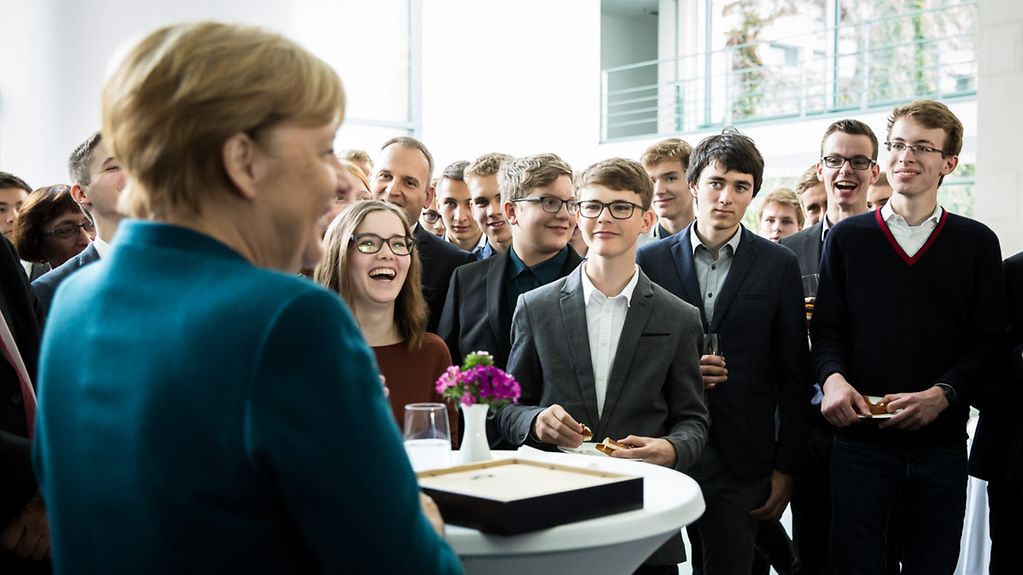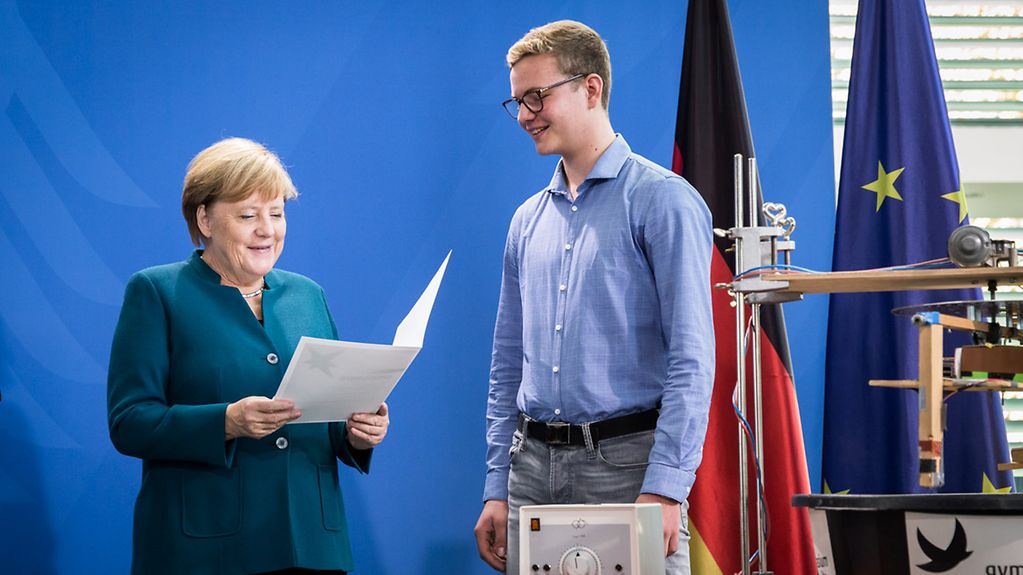Angela Merkel receives the national prize-winners of the young scientist of the year competition "Jugend forscht"
It is an event she looks forward to every year. On Thursday, Chancellor Angela welcomed this year’s prize-winners from the national young scientist of the year competition "Jugend forscht" to the Federal Chancellery. She also presented her special award for the most original entry.
3 min reading time

More than 50 young scientists met the Chancellor and received prizes for their projects
Photo: Bundesregierung/Steins
Chancellor Angela Merkel had special praise for the fact that the young scientists both conducted top-level research and accepted responsibility for making the world better. "They want to do their bit by not only describing problems but also resolving them, and thus improving people’s lives."
The Chancellor encouraged the young scientists to continue to seek out new challenges with the necessary tenacity and curiosity even after the competition, rather than resting on their laurels.
This is the 54th time the young scientist of the year competition "Jugend forscht" has been held. It was founded in 1965 by Henri Nannen , then editor in chief of the German news magazine "stern". Over 280,000 young people have entered the competition to date. 5,000 voluntary helpers (teachers and instructors, professors and human resources specialists) are the foundations on which the competition rests. They supervise projects and manage the competition itself. The individual projects are judged by some 3,000 university and college lecturers, and experts from the private sector – all of them giving their time and expertise voluntarily.
Jugend forscht – a success story
Taking part in the competition has already helped many talented young people decide on their future career. The Chancellor was impressed by the fact that "90 per cent of the young people who are successful in 'Jugend forscht' go on to study maths or sciences and to work extremely successfully in these areas".
Germany is already well placed in what are termed the MINT subjects (maths, IT, sciences and technology) said Angela Merkel. But in the face of the shortfall in skilled workers, even more must be done. The German government has put in place sound conditions for education and research as a foundation.
The motto of this year’s "Jugend forscht" was "Frag Dich" (ask yourself). More than 12,000 young scientists entered over 6,500 projects nationwide. The competition rewards special efforts and special talent in the MINT subjects. The aim is to kindle the enthusiasm of young people for these subjects in the long term, and to support them in their subsequent career choices even after the competition.
Special award for the most original entry – how do roads develop "six-packs"?
The phenomenon is nothing new to drivers and cyclists. Over time some roads develop small ripples which cause unpleasant jolting, especially during braking. But what causes the ripples?
To investigate the phenomenon Anton Fehnker (aged 17) and Simon Raschke (aged 18) devised an unusual experiment. They used a windscreen wiper motor to power a wheel that drove round and round a sand-filled basin for a longer period of time. After a fairly short time the wheel began to "jump", as the first ripples formed on what had been a flat sand surface. A detailed analysis of the measurements indicated that the ripple formation is not linear. It follows a highly complex, chaotic set of rules.

Anton Fehnker is presented with the Chancellor's special award for the project "How do roads develop six-packs?"
Photo: Bundesregierung/Steins
The duo received the Chancellor’s special award for the most original entry, which comes with a 3,000 euro cheque. This entry, said the Chancellor, is an example of an experimental and physical approach to a complex problem experienced in everyday life.
Questions to the Chancellor
The young scientists also had the chance to put their questions directly to the Chancellor. Questions covered not only political issues but also Angela Merkel’s own career path.
The Chancellor told her audience about her time working as a physicist in the former German Democratic Republic. "If I hadn’t lived in East Germany I might have become a teacher," she revealed. "Even in a socialist system one mole is one mole." But in contrast to the absolutes of chemistry, the political system shaped much of the work of teachers in the German Democratic Republic.
Asked whether she could imagine sponsoring a "Jugend forscht" project, the Chancellor said she had other plans for after her political career. "I have been awarded a number of honorary doctorates and I would like to visit all these universities, give talks and take part in discussions there."